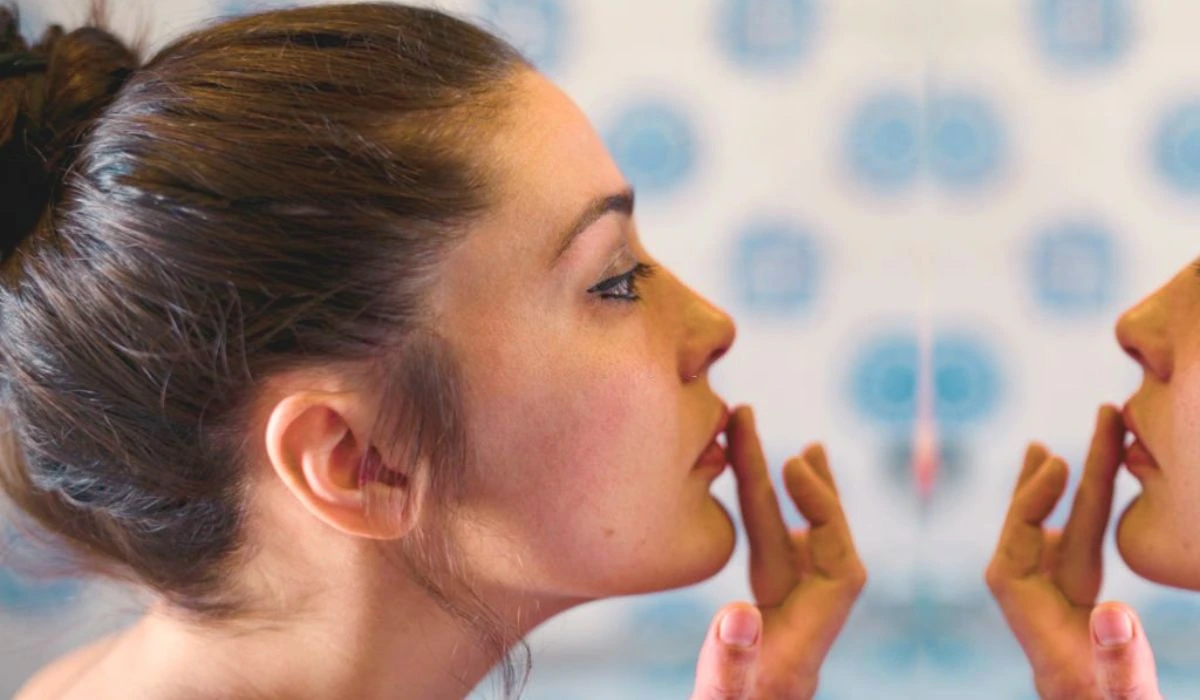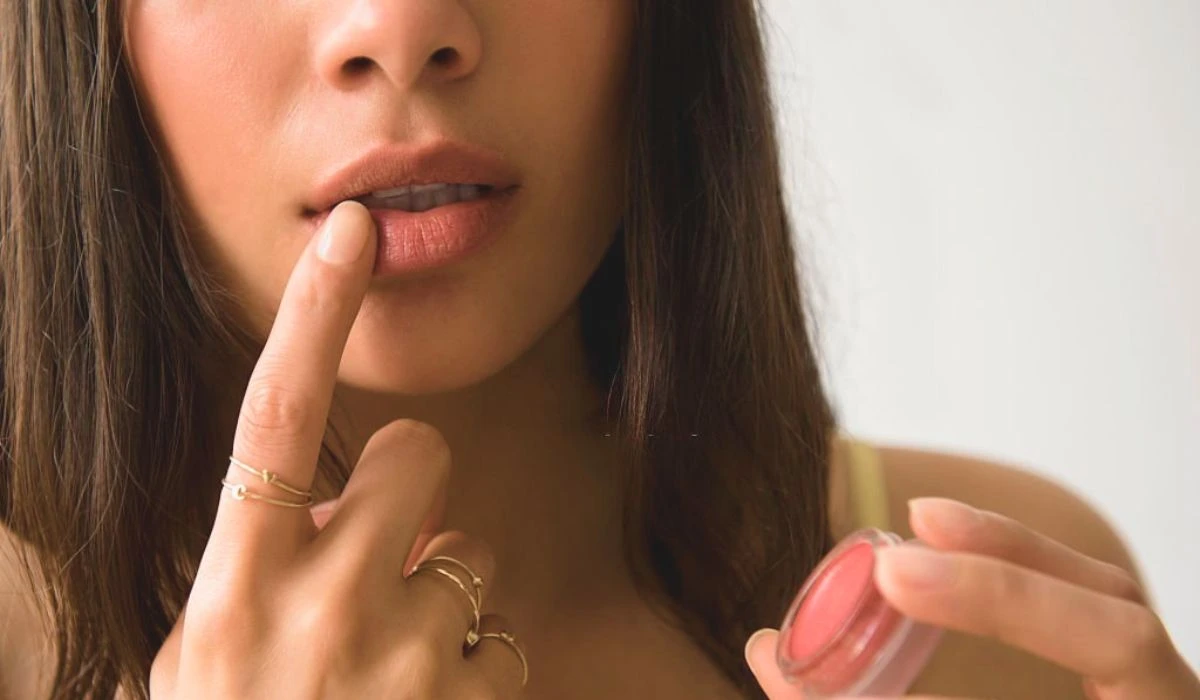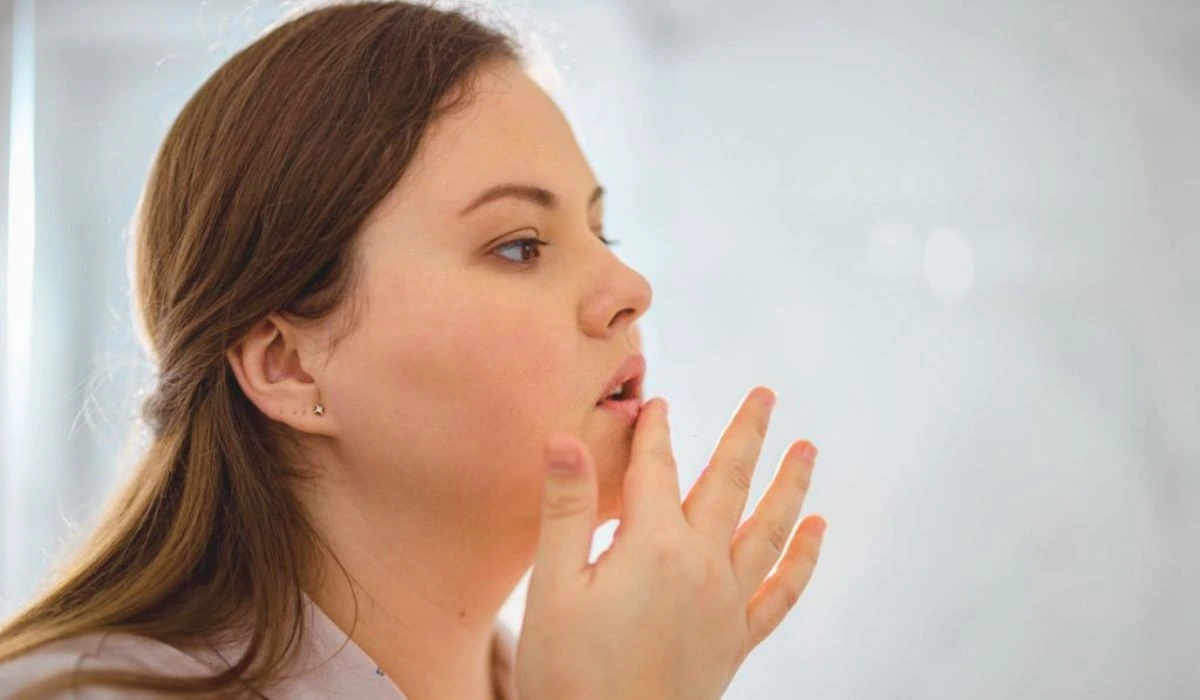Dry lips are an annoying condition a lot of people deal with. They lack hydration, leading to pain and discomfort. In this piece, we’ll go over the causes and treatments for dry lips.
The skin on our lips has no oil glands, so it’s more prone to drying out. It can be due to cold weather, dehydration, licking them too much, certain drugs, or sun exposure.
Plus, certain medical issues like eczema or psoriasis can appear on the lips, causing dryness and flakes. To treat them, you need to deal with the underlying problem.
Understanding Dry Lips
Dry lips can be a nuisance. They can be flaky, cracked, and very uncomfortable. Several things can cause them, like weather, dehydration, licking your lips too much, and certain medications.

When the skin on your lips doesn’t have enough moisture, it can get dry. Cold winds or dry air, plus not drinking enough water, can also cause dryness.
By understanding the causes of dry lips and taking proper care of them, you can enjoy soft, supple lips all year round.
What Are The Causes Of Dry Lips?
Dry lips, a common condition known as xerostomia, can occur due to various factors. The underlying causes include environmental factors such as cold weather, low humidity, and excessive heat.
Additionally, certain medications, such as antihistamines or certain acne treatments, can also contribute to dry lips. Furthermore, dehydration, smoking, and excessive licking or biting of the lips can exacerbate the problem.
It is important to note that dry lips can also be a symptom of underlying medical conditions like Sjögren’s syndrome, hypothyroidism, or vitamin deficiencies. Taking into consideration these factors, it is crucial to identify and address the root cause of dry lips to alleviate discomfort and prevent potential complications.
? Environmental Factors
Environmental factors can cause dry lips. Exposure to hot or cold weather, strong winds, and polluted environments can strip natural oils from the lips. To protect them, use lip balms with SPF when outdoors and opt for natural products.
Low humidity levels and air-conditioned/heated rooms sap moisture from our lips. Drinking enough water and using humidifiers helps too. Habits like licking lips and breathing through the mouth also lead to dryness.
To prevent & treat dry lips, apply nourishing lip balm regularly and create habits that hydrate them.
? Dehydration
Dry lips can be caused by dehydration. When our bodies lack water, it has a toll on our skin, including our lips. Here are five key points about dehydration’s effect on lips:
- Dehydration causes dryness and chapped lips.
- Low water intake results in decreased saliva production = dry lips.
- Dehydrated lips may appear cracked and flaky, causing sensitivity.
- Staying hydrated keeps lips soft and supple.
- Environmental factors like heat/cold can exacerbate dryness.
Some unique details about dehydration and lip health include:
- Certain medications and medical conditions can contribute to dehydration.
- Licking lips makes them drier.
To combat dry lips, here are five steps:
– Drink sufficient amounts of water.
– Use a lip balm with beeswax/shea butter to lock in moisture.
– Wear a scarf or apply petroleum jelly outdoors.
– Avoid licking your lips.
– Use a humidifier in your living environment.
These tips work because water replenishes fluids, lip balms provide protection, scarves/petroleum jelly protect from extreme temperatures, and a humidifier keeps the air moisturized.
? Weather Conditions
Harsh weather can really dry out lips. Cold, hot temps, strong winds, and low humidity can strip moisture from delicate skin, causing dryness and chapping. This disrupts the natural barrier of the lips, making them more prone to dehydration.
Sun exposure without protection can also lead to dry lips. UV rays can damage skin cells, leading to loss of moisture. To protect lips from sunburn and drying, use lip balms with SPF when outdoors.
Indoor heating and air-con systems can really worsen the condition of dry lips. Low humidity levels in these artificially controlled environments can lead to dehydrated skin and dryness. Humidifiers and bowls of water in rooms with central heating/air con can help maintain moisture levels.
? Allergies
Allergies can lead to dry lips, due to inflammation and irritation. Allergens such as certain foods, medications, cosmetics, and even weather can trigger this condition. If you are prone to hay fever or eczema, you might be even more likely to experience dry lips.
Identifying what is causing your dry lips is important. Allergies may be the cause, but not always. Dehydration, vitamin deficiencies, and licking your lips a lot can also contribute. So, it is best to visit a healthcare provider to get an accurate diagnosis.
Prevention For Dry Lips

To effectively prevent and treat dry lips, consider the following options:
? Hydration
Hydration is key to a healthy body! It not only quenches thirst, but can also promote healthy skin, boost energy levels, aid weight management, and enhance exercise performance. Don’t forget to stay hydrated – dehydration can lead to fatigue, dizziness, headaches, and muscle cramps.
Here are some easy strategies to ensure that your body stays properly hydrated:
- Drink plenty of water – 8 glasses every day!
- Electrolyte-rich beverages like sports drinks or coconut water can help.
- Eat hydrating foods with high water content, such as cucumbers, watermelons, and oranges.
- Balance your caffeine intake with adequate water consumption.
- Monitor urine color. Clear or light-colored urine indicates proper hydration, while dark-colored urine suggests dehydration.
? Avoiding Irritants
Besides environmental irritants, it’s important to be aware of lifestyle factors that can make irritation worse. Smoking and drinking too much alcohol can worsen symptoms and slow the healing process. Making healthier choices can have a big impact on your health.
Good hygiene is also key when avoiding irritants. Washing hands with mild soap and water helps remove irritants from the skin. Using hypoallergenic laundry products and fabric softeners can reduce exposure to chemicals that cause skin or breathing problems.
People with allergies or sensitivities should read product labels carefully. Understanding the ingredients in personal care products, cosmetics, and cleaning products lets you make informed decisions and avoid substances that might cause irritation.
? Lip Balms And Moisturizers
Lip balms help lock in moisture, avoiding dryness and chapping. They form a layer that shields lips from rough external conditions.
Moisturizers, in contrast, provide long-term hydration for soft and supple lips. They replace the moisture lost due to cold weather or too much sun exposure.
Both lip balms and moisturizers come in different forms, like those with natural components like shea butter or beeswax. These components provide extra advantages like calming irritated lips and helping with healing.
Home Remedies For Dry Lips
Dry lips can be treated with various home remedies. Here are five effective options to alleviate the dryness:
✅ Honey And Coconut Oil
Want to bring your lip care routine to the next level? Honey and coconut oil are an amazing pair! Here’s why:
- Honey is a natural humectant, which means it draws in moisture and keeps lips hydrated.
- Coconut oil has fatty acids that nourish and soften the skin of your lips, preventing dryness.
- Using honey and coconut oil together creates a protective barrier on your lips, blocking out harsh elements.
- Both honey and coconut oil have antibacterial properties, which can help stop infections on cracked or chapped lips.
- Using this mixture regularly will help heal your lips and make them soft and smooth.
For an extra boost, use raw honey. It has not been processed or heated, so it preserves its natural enzymes and is more effective at moisturizing.
✅ Cucumber Slices
Cucumber’s hydrating power helps protect lips from dryness. The cool temperature reduces discomfort. Vitamins and minerals, like vitamin C and silica, nourish and revive the skin. Plus, cucumber’s enzymes gently remove dead skin cells, making lips softer and smoother.
For best results:
- Slice a cucumber into thin rounds.
- Place directly on lips for 10-15 minutes.
- Massage in circular motions to let the juices sink in.
- Do this daily or as needed.
- For an extra boost, refrigerate before applying.
✅ Aloe Vera Gel
Aloe Vera gel works as a moisturizer, keeping lips hydrated and avoiding further dryness. Its gel-like texture forms a protective coating on the skin, locking in moisture.
The anti-inflammatory elements of Aloe Vera help decrease swelling and redness, making it great for chapped lips due to extreme weather or licking too much.
Aloe Vera has cooling properties that give instant relief from pain or irritation caused by dry lips. It relaxes sensitive skin, getting rid of any inflammation or burning feeling.
Aloe Vera contains lots of vitamins and minerals, helping nourish lips, stimulating healthy cell renewal, and stopping them from drying out again.
✅ Exfoliation Techniques
Exfoliating dry lips is essential for healthy-looking skin. Try these techniques regularly and you’ll be rewarded with super soft and smooth lips!
- Gently massage a lip scrub with moisturizing ingredients in circular motions.
- Lightly brush your lips with a soft toothbrush.
- Mix sugar and honey to create a natural exfoliant.
Do not over-exfoliate; stick to once or twice per week. Don’t forget to apply a nourishing lip balm afterward to lock in moisture. With these tips, you can keep your lips smooth and supple!

